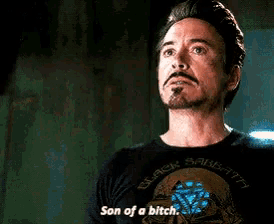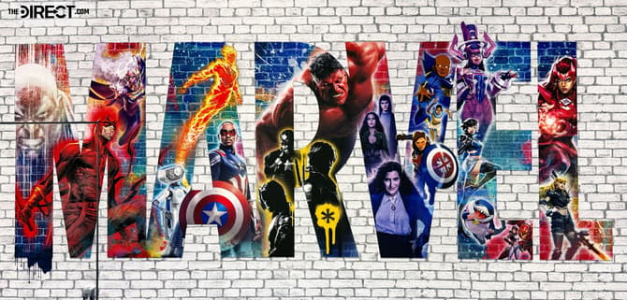Black Panther is no joke.
It’d be easy to snark about how Captain America and Iron Man were barely managing to hold their alliance together until a certain black cat crossed their path, but the truth is – they both want him on their side.
Black Panther commands respect. (And you definitely don’t want him against you.)
The historic first black comic book superhero will be getting his own stand-alone movie in February 2018, but we’ll first encounter Chadwick Boseman’s warrior-prince on May 6 in the clash between heroes in Captain America: Civil War.
Panther is a key figure in the conflict between Chris Evans’s Cap and Robert Downey Jr.’s Iron Man, and his allegiance is in flux — although he’s got serious issues with Sebastian Stan’s Bucky Barnes, a.k.a. the Winter Soldier, which steers him alongside the man in the iron mask.
While Tony Stark is known for flooding the zone with wisecracks, Black Panther isn’t fooling around.
“He’s definitely not the life of the party in this instance,” says Boseman, who won the role last October. “I think this is something true of the comic book character and the movie. You never quite know where he stands. There’s always a bit of concealing and mystery. So I think mysterious is more his boat. Not to say there’s not charm and he can’t be a ladies’ man and all that. It’s more like if there is humor, it’s more like James Bond.”
Next spring, around the time the character makes his screen debut, Marvel Comics will publish a new Black Panther comics series written by Ta-Nehisi Coates, the journalist whose book, Between the World and Me, a missive to his own son about living as a black man in the United States, recently won the National Book Award for Nonfiction.
So, even in real life, Black Panther has a powerful legacy — and one that’s still growing.
The movie has a lot to live up to.
In Civil War, T’Challa is drawn into the conflict between Cap and Iron Man that arises from the Sokovia Accords, which were enacted by world leaders after the events of Avengers: Age of Ultron as a way to mandate control over those with “enhanced abilities” who say they only want to do good for the world.
“There definitely is a sort of tradition that he’s torn between, in terms of how things were done in the past and how things need to happen now in this new world,” says Boseman, who’s best known for playing James Brown in Get On Up and Jackie Robinson in 42. “I think there’s perhaps a bit of a maverick there, and then there’s also a need to live up to traditions and his father’s legacy. And not even his father’s legacy, but the entire nation of Wakanda. I think those are the things you will see.”
Under different circumstances, Steve Rogers, another warrior whose very identity represents his country, might find common ground with Panther.
“I love our scenes together because I do think they feel a sense of responsibility. I think they’re both very selfless people,” Evans says. “They want the right thing, no one’s irrational, no one has an inflated ego.” (That’s got to be a dig at Iron Man, by the way.) “They’re family-first people,” Evans says. “I think outside of the suits we’d be friends, Steve and T’Challa.”
Kevin Feige, the president of Marvel Studios and creator of the interlocked series of movies (Civil War is No. 13, for those keeping track), says Panther was added to the story ahead of his solo-movie debut because the story needed someone who had his own agenda, who was a third party separate from the factions that aligned themselves behind Captain America and Iron Man.
“We kept talking about ‘Somebody like Black Panther …’ After the third or fourth time that came up in a development meeting, someone said, ‘Can’t we just do the Black Panther?’ And we all looked at each other and said, ‘Yeah, I guess we could,’” Feige says. “We introduce him here, give him an arc, and make him a full character. We don’t just give him a cameo, to wave. He has his own conflict and his own people that he’s looking out for.”
Executive producer Nate Moore calls T’Challa “the undecided voter”: “He’s someone who hasn’t necessarily made up his mind about either side and whose agenda isn’t exactly what Cap’s agenda or what Tony’s agenda is. And I think that brings him into conflict weirdly with both characters at different times in the film. He is the prince of an African nation that has so far stayed very much sort of in the shadows. And eventually the film will draw him and his father out of the shadows.”
The movie version is also not the same Black Panther fans now see in comics, almost 40 years after his creation. “In publishing, he is sort of this very wise and a sanguine figure who seems to know more than he lets on,” Moore says. “I think this is Black Panther in his younger years, where he maybe is a little bit more fiery than I think how they write him in the comics because he’s very much in the nascent stages of being a hero. So that means he is probably more fallible than the Black Panther that you read in comics, but for reasons that are completely logical.”
In the trailer for Civil War, we catch only a glimpse of Black Panther — delivering a spin-kick to the face of Winter Soldier — the brainwashed assassin and former best friend of Captain America’s, who is seeking redemption but has apparently been framed for a horrible crime. (No spoilers, but it’s not much of a leap to assume that T’Challa’s father may have been one of the victims of the blast targeting those world leaders, and was either killed or seriously hurt.)
But Boseman says no one’s loyalty is simple in this story. “Ultimately some sides are taken, but I think the trick of the movie is for no one to be blindly following,” he says. “Everybody is actually on their own side, in truth.”
Unlike Chris Hemsworth’s Thor, another prince from a far off kingdom, who was introduced in the movies as a petulant prince unworthy of his powers and title, T’Challa doesn’t have those kinds of hang-ups. “The spoiled brat thing is never an option,” Boseman says. “He’s not in any way unaware of how important his role and his position is. I think he’s very much aware of the responsibility.”
So the responsibility thing is down. But what are his great powers?
“Panther is a cool character and he has a toughness, and a sort of intimidation factor with his costume,” says Anthony Russo, who directed Civil War with his brother, Joe. (The pair also made Captain America: The Winter Soldier together and are signed on to make the two-part Avengers: Infinity War movies in 2018 and 2019.) “We’re experimenting with how the light catches the costume.”
That’s because Black Panther’s outfit is not actually cloth. It’s metal. It’s vibranium. “It has a sheen because its a weave of the strongest metal in this fictional universe,” says Joe Russo.
“It’s like medieval chain mail, woven extremely thin,” Anthony adds. “It’s not comparable to any other costumes in the universe.”
Ask Boseman about the suit, and he lets out a low, rumbling laugh. “Are you talking about the mythology or the actual suit?” he says. The fiction is amazing, he says, but actually wearing the thing… not so much. The narrow, white-lensed eyes made it particularly hard for the actor to simply see where he was going.
“As far as the actual suit is concerned, I would say there’s a lot of comfort in the shoes, or the boots,” Boseman says. “That’s probably the only part I did enjoy! After you get them on you’re like, ‘Okay, that feels good.’ But other than that, I remember feeling extremely hot and claustrophobic, like, ‘How in the world am I gonna move and act and respond in this?’ But the shoes feel good. Everything else you get used to.”
But the imaginative parts? That was fun.
“As far as the storytelling is concerned, the vibranium is a metal that is dynamic. It can change how it’s used. It’s not a liquid, but it has the ability to change shape and change form and still have its strength. I think there a lot of things about that in the mythology that I think has a lot of potential in terms of the storytelling,” Boseman says.
Vibranium is not your typical armor. “It’s not just about being durable, it has the ability to absorb energy,” Boseman says. “It’s not just like you hit it and it doesn’t take it. It has the ability to absorb the attack of another person and repel or respond to that attack. That’s part of the power.”
As for fighting style, Black Panther has a unique amalgam of moves. “There are some animal forms, but not just cat. He could be a snake, or various different styles. Obviously there’s an opportunity to do some capoeira,” the Brazilian martial art that combines fighting with dance, Boseman says.
Part of Panther’s power is not just brute strength, but thinking ahead. “The key with T’Challa is to keep everybody on their toes. It’s to do the thing that is surprising, that you wouldn’t expect. So there’s a lot of agility and a lot of, like, ‘Why did he do that? Oh now I know why he did that. He was gonna come over here after he did that.’ I wouldn’t say he’s a ninja, but he does employ some of those aspects as well.”
Panther’s retractable claws are also made of vibranium — and since Cap’s shield is also forged from the substance: Who wins in a fight?
The Russo brothers have a simple answer for that: “We shall see,” Joe says.
But from Boseman’s point of view …? There’s not even a question.
“If you’re talking to Mayweather about the Mayweather/Pacquiao fight, then Mayweather’s gonna say he’s gonna win,” Boseman says. “I have to back myself.”
 . A slight British accent would work better
. A slight British accent would work better
 Man yall dudes jump to Coming to America when yall think African accents?
Man yall dudes jump to Coming to America when yall think African accents?



































